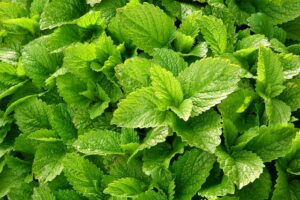Introduction
Lemon balm, scientifically known as Melissa officinalis, is a perennial herb in the mint family. Originating from Southern Europe and the Mediterranean region, it’s now grown worldwide. The medicinal properties of lemon balm in traditional medicine is known for its calming effects, improving mood, and cognitive function, and promoting The plant, with its delicate lemon scent, is valued for its culinary appeal as well.
Historical Use in Traditional Medicine
Lemon Balm has been used as a medicinal herb since the times of the Ancient Greeks and Romans. Prominent figures in history such as Dioscorides and Paracelsus laud its therapeutic properties. It was traditionally used to uplift spirits and enhance memory. Medieval herbalists used the herb for treating nervous disorders, imparting a calming effect. In the Middle Ages, it was an ingredient in the famed Carmelite Water, a concoction used for nervous headaches and neuralgic affections. Over time, its use spread worldwide, and it became an essential part of folk medicine in many cultures, appreciated for its soothing and mood-boosting effects.
Medicinal Properties of Lemon Balm
Essential oil composition
Citronellal
Citronellal is one of the primary components of lemon balm’s essential oil, comprising about 36-76% of the oil’s total composition. This compound is primarily responsible for the herb’s prominent lemon aroma. Beyond its olfactory contribution, citronellal has beneficial therapeutic properties. It’s renowned for its antiviral, antimicrobial, and anti-inflammatory activity. Research also suggests it may have anxiety-reducing effects, underscoring the calming benefits traditionally associated with lemon balm.
Geranial
Geranial, another key component of lemon balm’s essential oil, constitutes about 10-20% of the oil’s total composition. This component, along with citronellal, is responsible for the characteristic lemon scent of the herb. However, its benefits are not confined to its aroma only. Geranial exhibits potent antimicrobial and antifungal properties, making it instrumental in the herb’s use for wound healing and combating infections. Recent studies also suggest that geranial may have neuroprotective effects, potentially contributing to the cognitive benefits associated with lemon balm.
Neral
Neral is another significant component found in lemon balm’s essential oil, making up around 10-30% of the oil’s composition. Like citronellal and geranial, neral contributes to the distinctive lemon-like aroma of the herb. Beyond its olfactory significance, neral possesses valuable health benefits. It exhibits strong antibacterial and antifungal properties, adding to the protective features of lemon balm. Some research indicates that neral could have calming and relaxant effects on the nervous system, further enhancing lemon balm’s reputation as a soothing herb.
Antioxidant Properties of Lemon Balm
Apart from its well-known calming and mood-enhancing effects, lemon balm is also recognized for its antioxidant properties. The essential oils present in the herb, including citronellal, geranial, and neral, contribute to its antioxidant activity. These compounds may help protect cells from damage caused by free radicals and oxidative stress. Lemon balm’s antioxidant properties may also have a role in promoting skin health, as they can aid in reducing inflammation and oxidative damage.
Antimicrobial Properties of Lemon Balm
In addition to its antioxidant properties, Lemon Balm also exhibits strong antimicrobial properties. The essential oils present in the herb, such as geranial and neral, are known for their potent antibacterial and antifungal effects. These compounds can inhibit the growth of a variety of microbial pathogens, making lemon balm a natural protective agent against infections. Furthermore, studies have explored the herb’s potential in combatting resistant strains of bacteria, underlining its potential medicinal value. However, more research is needed to fully understand the scope of Lemon Balm’s antimicrobial properties and how they can be best utilized for health benefits.
Antiviral Properties of Lemon Balm
Lemon Balm has also been noted for its antiviral properties, especially in relation to the Herpes simplex virus. The rosmarinic acid and flavonoids found in the herb can inhibit the replication of the virus, thereby reducing the severity and length of outbreaks. In fact, several studies have shown that topical application of Lemon Balm extract can lead to an improvement in symptoms of cold sores, a common manifestation of the Herpes virus. The herb’s antiviral properties aren’t limited to Herpes simplex, however, with preliminary research indicating potential effectiveness against other viruses. As with any potential health benefit, ongoing research is necessary to further investigate and confirm these antiviral properties.
Calming Properties of Lemon Balm
Lemon Balm is highly recognized for its calming properties. The herb is often used as a natural remedy to help alleviate stress, anxiety, and promote a sense of calm. Active compounds such as rosmarinic acid and flavonoids within Lemon Balm are believed to interact with the GABA receptors in the brain, which can lead to decreased anxiety and a soothing effect. In addition, it’s frequently used in the treatment of insomnia and other sleep disorders due to its sedative properties. Some studies have even explored the potential of Lemon Balm in improving cognitive function and easing symptoms of restlessness, particularly in people with Alzheimer’s disease. While promising, these calming benefits require further research to substantiate these initial findings and to better understand the underlying mechanisms.
How to Use Lemon Balm
Lemon Balm, owing to its culinary and therapeutic properties, can be employed in various ways. It is commonly used as a flavoring in food and beverages, providing a fresh, lemony zest to dishes. As a herbal tea, Lemon Balm can be brewed to help alleviate stress, improve sleep, and boost mood. It can also be used topically, with the essential oil extracted from the herb applied directly onto the skin for its antioxidant and antimicrobial benefits. Please consult with a healthcare professional or herbalist before beginning any new herbal remedies to ensure it’s safe and appropriate for your specific health needs.
Conclusion
In conclusion, Lemon Balm is a versatile herb with a bounty of potential health benefits. It offers antimicrobial, antiviral, and antioxidant properties, making it a valuable addition to one’s dietary and wellness routine. Whether used in culinary applications, brewed into a soothing tea, or applied topically, Lemon Balm could play a valuable role in promoting health and wellbeing. However, it’s critical to consult with a healthcare professional or trained herbalist before beginning any new herbal therapies to ensure safety and efficacy. The true extent of Lemon Balm’s potential health benefits are still being explored, with ongoing research promising to shed further light on this intriguing herb.
References:
https://pubmed.ncbi.nlm.nih.gov/35453415/
https://pubmed.ncbi.nlm.nih.gov/34449930/
https://pubmed.ncbi.nlm.nih.gov/32614129/
https://pubmed.ncbi.nlm.nih.gov/30681971/


